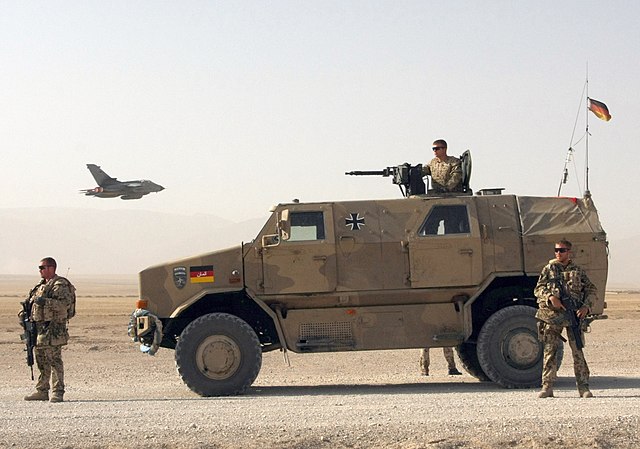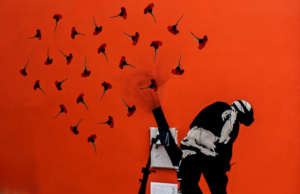Stefan Liebich, Member of the German Bundstag and vice chair of the Parliamentarians Group on the USA, on his party’s position on German military intervention, differing views within DIE LINKE, and the lessons to be drawn.
‘How long will the intervention last? What are the concrete tasks? What are the combat goals? When will they be achieved? When is the intervention finished?’ These were the questions the chair of the PDS Bundestag group Roland Claus posed in November 2001 in the German Bundestag when Federal Chancellor Gerhard Schröder (the Social Democratic Party – SPD), together with his Foreign Minister Joseph Fischer (Alliance 90/The Greens), moved for the participation of the Bundeswehr in the war in Afghanistan.
They were the right questions, as we know today, twenty years later. No answers were given at the time. Instead, a majority of the other parties in the government and opposition approved Germany’s participation in George W. Bush’s so-called ‘War on Terror’.
Shortly after the terror attacks in New York City and Washington DC, the PDS was among the organisations issuing a call to the demonstration ‘No Power to Terror – Solidarity With the United States’. But at the same time it warned that war would be the wrong answer to the terrible crime, because it would always also kill innocent people and carry the danger of fomenting still more radicalism.
If it had then – in 2001 – been clear that the Bundeswehr deployment would last almost twenty years, with 150,000 soldiers flying to the Hindu Kush, and that 59 soldiers would lose their lives, with countless psychologically and physically wounded – if this were known there would never have been a majority in the Bundestag for deployment. In any case, there was never a majority for it in the population. And there certainly would not have been approval if there were any inkling that at the end of it all the Taliban would be back in power and again proclaim their Islamic emirate.
The president of the United States, Joe Biden, has now said after the defeat:
‘We went to Afghanistan almost 20 years ago with clear goals: get those who attacked us on September 11th, 2001, and make sure al Qaeda could not use Afghanistan as a base from which to attack us again. We did that. […] That was a decade ago. Our mission in Afghanistan was never supposed to have been nation building.’
But the tone was completely different back then in Germany but also in Afghanistan. To fight for freedom, human rights, and democracy, for women’s rights, and education for girls – those were goals that appeared worthwhile.
Obviously, the US administration lied to the public and its allies. This is even documented by the Washington Post in their publication of the Afghanistan Papers. None of the generals questioned in an internal Pentagon investigation believed in a positive course of the war, let alone a victory. But they publicly said the opposite.
When I confronted German Foreign Minister Heiko Maas with this in a session of the Bundestag’s Foreign Affairs Committee, he answered me that he didn’t know the Afghanistan Papers. In Germany only the PDS, later DIE LINKE, unanimously took the position that the Bundeswehr deployment was a mistake and should be ended. In September 2009 a German colonel ordered the bombardment of a tanker truck in the city of Kunduz. One hundred civilians died, several children amongst them.
When DIE LINKE deputies displayed the names of the dead in the Bundestag, our group was excluded from the session. In the other parties, too, the number of doubters grew, but year after year the mission was extended. In this the governments made up of the SPD, Alliance 90/The Greens, CDU, CSU (both conservative), and FDP (liberal) followed the zigzagging course of the US administration without their own strategy. They even refused a serious evaluation. There was not even a thought about protecting the people in Afghanistan that had collaborated with the Germans, while those of us in Die LINKE continuously brought this up.
But in view of the tragedy now playing out in Afghanistan self-righteousness is out of place. People need to be helped who have borne the brunt of this wrongheaded policy – those who believed the promises and are now being persecuted by the Taliban for it. The least that the world community can do is to extend protection to those who want to leave the country. Germany too bears responsibility due to its presence in Afghanistan and must not shirk it now.
And then lessons have to be drawn for future action. The policy of effecting a ‘regime change’ with military means has repeatedly failed and definitively so in Afghanistan. I am not at all against the idea of Germany actually assuming more responsibility. It was good that Chancellor Merkel tried, together with the French, Russian, and Ukrainian presidents, to find a peaceful solution to the war in Eastern Ukraine. And also the attempt to find a way out for mistreated Libya was good and right. Germany could play a mediating role here only because, in the UN Security Council in 2011, the Merkel/Westerwelle government had not agreed to the military intervention in Libya and did not directly participate. More responsibility does not mean more soldiers!
I still maintain that not every foreign Bundeswehr deployment means participation in war and therefore we have to carry out the debate in each individual case without prejudging. And not all of our positions on Afghanistan were always consistent. In 2009, Bodo Ramelow, the then vice-chair of our parliamentary group and current Prime Minister of the East German state of Thuringia, correctly warned, along with others, that an immediate withdrawal of the Bundeswehr would result in exactly what we are now seeing. For this he met with fierce criticism from his own ranks.
But in rejecting war in Afghanistan we were always united.
We still insist that the struggle against terror can be won but a war against it cannot.



